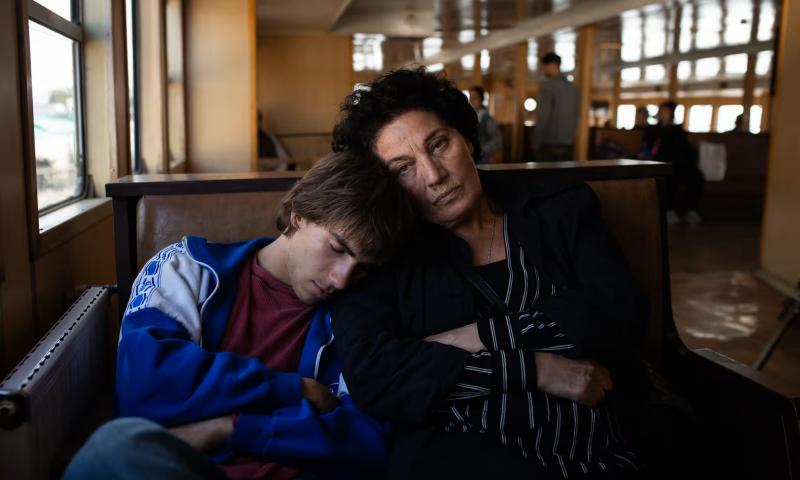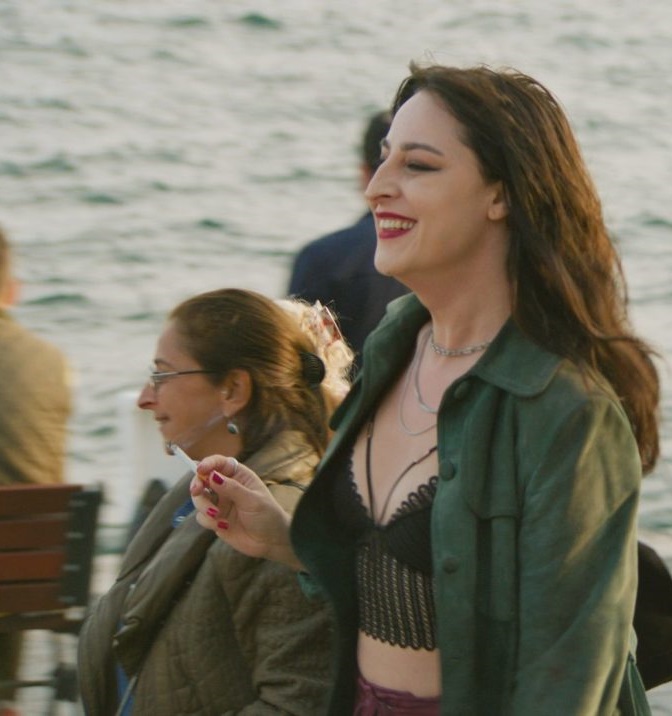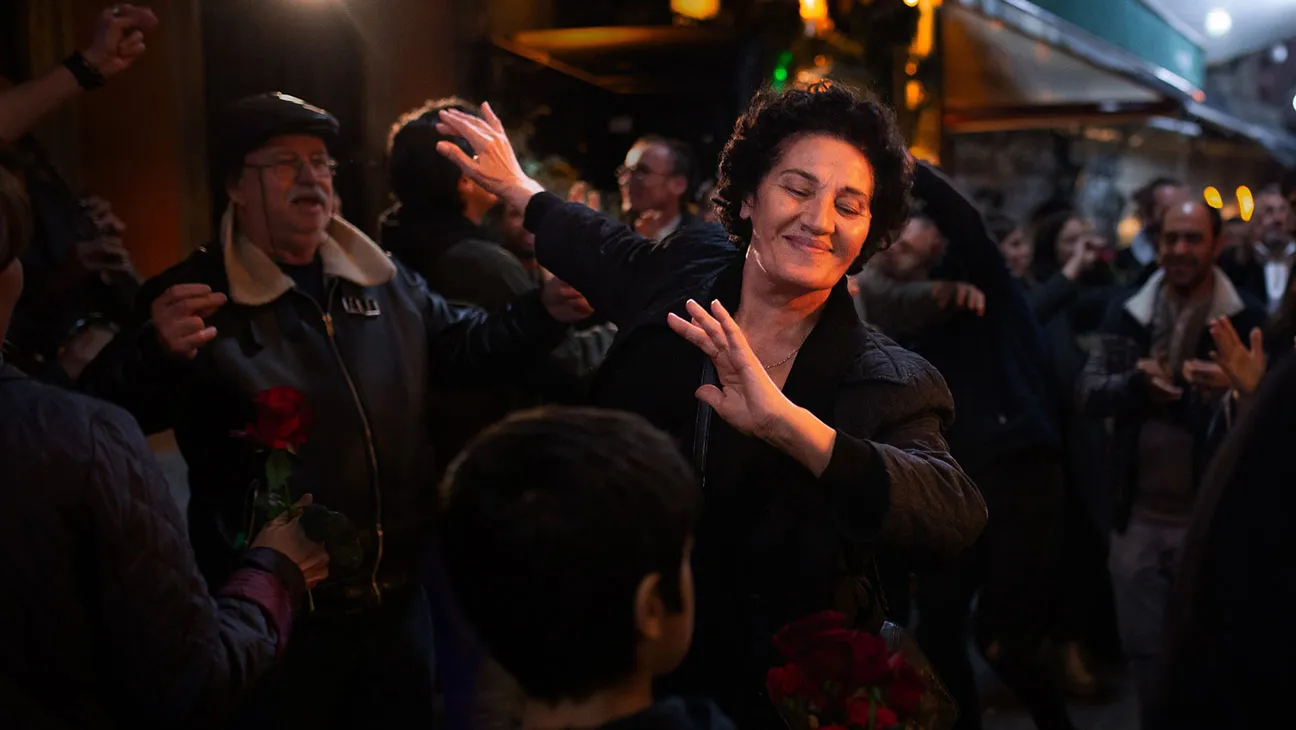Crossing review - a richly human journey of discovery | reviews, news & interviews
Crossing review - a richly human journey of discovery
Crossing review - a richly human journey of discovery
Levan Akin offers a masterfully observational perspective on Georgian, Turkish worlds

Crossing is a remarkable step forward for Swedish-Georgian director Levan Akin. There are elements that build on his acclaimed 2019 Tbilisi drama And Then We Danced, but his new film is rich with a new complexity, as well as a redolent melancholy, a loose road-movie that speaks with considerable profundity of the overlapping worlds in which it is set.
The journey in question is from Batumi, the main seaport city of southwest Georgia, to Istanbul, where the greater part of the story unfolds, although narrative in itself is of less importance, Akin’s emphasis instead being on observational development. But in mood, and crucially in its central character Lia (Mzia Arabuli), this is a Georgian film through and through. If exuberance was the key element of And Then We Danced, with its central scenes of Georgian traditional dance, in Crossing it’s sadness, close almost to desolation that emanates from Arabuli’s harrowed face.
It’s a desolation that resounds in the stern determination with which she faces the confusions of the new world which she encounters, as well as the circumstances of the old world that she has temporarily left behind. Yet there’s a dignity in her stricken septuagenarian features that remains somehow unbowed; it’s tempting, even, to see her a symbol of her nation, one which has come through so many trials over the last three decades, and still faces travails in an uncertain future.
But that dominant mood is leavened by a rich vein of comedy, principally in the film’s central pairing. Crossing opens with Lia in a village on the Black Sea coast, looking for the last place where her niece Tekla was known to have lived; her sister has recently died, and she’s clearly trying to resolve something, both for herself and her late sibling. She has worked all her life as a teacher (her sternness surely comes from that profession), and she chances upon a past pupil, Zaza, whose respect for her is as palpable as his own circumstances are straitened. The rundown settlement has in the past been a place of refuge for the local trans community, a reality that Lia struggles to understand.
It’s Zaza’s younger brother, the feckless twentysomething Achi (Lukas Kankava), who shows the initiative, convincing Lia that he has the Istanbul address where Tekla was last known to have been, and that he should accompany her to find her. He’s a chancer, likeable enough but living on his wits, and eager to explore the wider world. Their agreement seems based on a rather tentative trust – Lia makes it clear that she will not be mothering him – and they cross the border to take the night bus ride to Istanbul.
From the closely observed, even intimate scenes of this opening, we are plunged into the bustle of the big city. Akin begins to weave together his film’s supporting story strands, foreshadowing encounters set to happen as Lia and Achi orient themselves, finding the centre of the local trans community, where Tekla may have lived, but initially little more. Even the two street kids who hustle for a tip as they guide this unlikely Georgian couple from the Bosphorus ferry will come to find their place in the interconnected narrative.
 We are introduced to its main link in a beautiful piece of cinematic language. As Achi takes that ferry crossing, he leans out over the boat rails, and the camera rises up a deck to focus on a woman smoking over the side above him. This is Evrim (Deniz Dumanl, pictured right), a thirtysomething transgender woman, now a lawyer volunteering with a trans rights NGO, her sex work behind her. With a cigarette almost always in hand, she dispenses advice in the face of a surrounding officialdom that is at best indifferent, at worst actively hostile to the trans community. We follow her first around hospital offices as she attempts to receive her new identity papers, a thankless process that involves bureaucratic delays and “fees” alike; gradually, too, we discover something of her private life, its disappointments, and subsequently small happinesses. Like Lia, she remains undaunted.
We are introduced to its main link in a beautiful piece of cinematic language. As Achi takes that ferry crossing, he leans out over the boat rails, and the camera rises up a deck to focus on a woman smoking over the side above him. This is Evrim (Deniz Dumanl, pictured right), a thirtysomething transgender woman, now a lawyer volunteering with a trans rights NGO, her sex work behind her. With a cigarette almost always in hand, she dispenses advice in the face of a surrounding officialdom that is at best indifferent, at worst actively hostile to the trans community. We follow her first around hospital offices as she attempts to receive her new identity papers, a thankless process that involves bureaucratic delays and “fees” alike; gradually, too, we discover something of her private life, its disappointments, and subsequently small happinesses. Like Lia, she remains undaunted.
Lia too presses on in her quest. They find a room is a dismal hostal, which brings its own community, friction with Achi bubbling over as the younger man sets out on his own exploring. She must confront her own prejudices, too. “This is the life she chose?” Lia asks of him, her shame and incredulity painful. “I hardly think it was a choice,” he replies with a wisdom that belies his fecklessness. There are brief encounters too, especially a chance meeting with a compatriot who hosts them for a better dinner than their meagre budget allows, a kindness-of-strangers moment that shows her both somehow returning to her earlier life – she dances gloriously in a spontaneous street performance (pictured below), the first of two such episodes that recall Akiin’s And Then We Danced – as well as revealing the vulnerability behind her stern pose. With Evrim’s help, the doors of the previously closed small trans communities – each seems to be based in a single apartment, overseen by a "mamasha" mother figure – open to her. Lia is warmly received even if any traces of Tekla remain scarce. “Istanbul is a place where people come to disappear,” she tells Achi at an early point, though the fact that she has come to look for her niece hits the trans women she encounters poignantly (“What if someone had come looking for us?”).
With Evrim’s help, the doors of the previously closed small trans communities – each seems to be based in a single apartment, overseen by a "mamasha" mother figure – open to her. Lia is warmly received even if any traces of Tekla remain scarce. “Istanbul is a place where people come to disappear,” she tells Achi at an early point, though the fact that she has come to look for her niece hits the trans women she encounters poignantly (“What if someone had come looking for us?”).
Akin offers little or no sense of an ending, though he seems to allow a degree of intuition, even something approaching visions, that offer momentary comfort. Life itself, especially the one we see here, is fluid, and his title expresses everything: we witness crossings, between past and present, tradition and modernity, across borders and the shores of the Bosphorus, between night and morning, presence and absence, life and death, a movement perhaps towards a degree of understanding. That may sound ever so high-fallutin, but Crossing is immaculately realised in its ground-level detail, from the poverty of rural Georgia to the crowded streets of Istanbul, complete with the city’s ubiquitous cat population.
And it’s immaculately realised, too, on the technical front, with roving, hand-held cinematography from Lisabi Fridell, who collaborated with Akin on And Then We Danced, that is as fluid as it is unobtrusive, though always catching the moments of power with the right emphasis. Its score, songs that move from Georgian to Turkish, have real tragic power, while resolutely avoiding the sentimental. Akin’s script attains a real humanism, one which surely harks back both to the 1960s glory years of Soviet Georgian cinema, and catches the intonations, almost always melancholy too, of local cinema production there in the last decade or so (Nana Ekvtimishvili and Simon Gross’s In Bloom and Levan Koguashvili Blind Dates just two films that come to mind). From further afield, there’s a sure affinity with Italian neo-realism, hints too perhaps of early Gus van Sant, certainly of early Wenders. Akin is a now a director of equivalent nuance, equivalent poise in his own right.
The future of Arts Journalism
You can stop theartsdesk.com closing!
We urgently need financing to survive. Our fundraising drive has thus far raised £49,000 but we need to reach £100,000 or we will be forced to close. Please contribute here: https://gofund.me/c3f6033d
And if you can forward this information to anyone who might assist, we’d be grateful.

Subscribe to theartsdesk.com
Thank you for continuing to read our work on theartsdesk.com. For unlimited access to every article in its entirety, including our archive of more than 15,000 pieces, we're asking for £5 per month or £40 per year. We feel it's a very good deal, and hope you do too.
To take a subscription now simply click here.
And if you're looking for that extra gift for a friend or family member, why not treat them to a theartsdesk.com gift subscription?
more Film
 Blu-ray: The Graduate
Post #MeToo, can Mike Nichols' second feature still lay claim to Classic Film status?
Blu-ray: The Graduate
Post #MeToo, can Mike Nichols' second feature still lay claim to Classic Film status?
 Little Trouble Girls review - masterful debut breathes new life into a girl's sexual awakening
Urska Dukic's study of a confused Catholic teenager is exquisitely realised
Little Trouble Girls review - masterful debut breathes new life into a girl's sexual awakening
Urska Dukic's study of a confused Catholic teenager is exquisitely realised
 Young Mothers review - the Dardennes explore teenage motherhood in compelling drama
Life after birth: five young mothers in Liège struggle to provide for their babies
Young Mothers review - the Dardennes explore teenage motherhood in compelling drama
Life after birth: five young mothers in Liège struggle to provide for their babies
 Blu-ray: Finis Terrae
Bleak but compelling semi-documentary, filmed on location in Brittany
Blu-ray: Finis Terrae
Bleak but compelling semi-documentary, filmed on location in Brittany
 Oslo Stories Trilogy: Sex review - sexual identity slips, hurts and heals
A quietly visionary series concludes with two chimney sweeps' awkward sexual liberation
Oslo Stories Trilogy: Sex review - sexual identity slips, hurts and heals
A quietly visionary series concludes with two chimney sweeps' awkward sexual liberation
 Sorry, Baby review - the healing power of friendship in the aftermath of sexual assault
Eva Victor writes, directs and stars in their endearing debut feature
Sorry, Baby review - the healing power of friendship in the aftermath of sexual assault
Eva Victor writes, directs and stars in their endearing debut feature
 Blu-ray: Who Wants to Kill Jessie?
Fast-paced and visually inventive Czech comedy
Blu-ray: Who Wants to Kill Jessie?
Fast-paced and visually inventive Czech comedy
 Oslo Stories Trilogy: Love review - freed love
Gay cruising offers straight female lessons in a heady ode to urban connection
Oslo Stories Trilogy: Love review - freed love
Gay cruising offers straight female lessons in a heady ode to urban connection
 Beating Hearts review - kiss kiss, slam slam
Romance and clobberings in a so-so French melodrama
Beating Hearts review - kiss kiss, slam slam
Romance and clobberings in a so-so French melodrama
 Materialists review - a misfiring romcom or an undercooked satire?
Writer-director Celine Song's latest can't decide what kind of film it is
Materialists review - a misfiring romcom or an undercooked satire?
Writer-director Celine Song's latest can't decide what kind of film it is
 theartsdesk Q&A: actor Leonie Benesch on playing an overburdened nurse in the Swiss drama 'Late Shift'
The Guildhall-trained German star talks about the enormous pressures placed on nurses and her admiration for British films and TV
theartsdesk Q&A: actor Leonie Benesch on playing an overburdened nurse in the Swiss drama 'Late Shift'
The Guildhall-trained German star talks about the enormous pressures placed on nurses and her admiration for British films and TV

Add comment